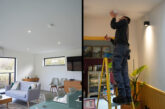
Scotland is ahead of the curve on the issue of CO alarms for private rented housing. Kidde Safety explains how following their approach throughout the UK will save lives and open up new opportunities for electrical contractors.
With Statutory Guidance taking effect on 1st December last year, private rented properties in Scotland now have to have carbon monoxide (CO) alarms wherever there are fixed combustion heating appliances, other than for cooking. Issued by the Scottish Government, it sets out what must be done to meet the Repairing Standard – a legal obligation throughout a tenancy. The guidance is in line with the 2015 building regulations Technical Handbooks, already applying to new and replacement combustion appliance installations.
More CO Alarms
A CO alarm is required wherever there is a combustion appliance, including inter-connected spaces such as integral garages. Appliances include a boiler, fire, heater or stove – whether using gas, oil, wood or other fuels – although, unfortunately, it does not cover fittings used solely for cooking, despite recent deaths from misused gas cookers. A CO alarm is also needed where a flue passes through ‘high risk accommodation’ such as a bedroom or main living room. The new rules also require potential risks to and from adjacent properties or shared spaces to be considered, as carbon monoxide can spread widely.
These sensible measures are generally in line with the latest British Standard guidance – EN 50292:2013 – and both go much further than recent regulations in England. There, the ‘Smoke and Carbon Monoxide Alarm (England) Regulations 2015’ only require a CO alarm in habitable rooms with solid fuel heating appliances. The continuing toll of deaths and illness resulting from carbon monoxide incidents from other fuels and types of combustion appliances, including cookers, makes a strong case for electrical contractors to promote installation of more CO alarms in line with the British Standard wherever possible.
Peace of Mind
For peace of mind, electrical contractors and their customers need to be confident in the long-term reliability of any CO alarms they install – particularly with the current presence of non-compliant products. Here, an established manufacturer with a reputation for quality, supported by third party accreditation, is essential. For example, all Kidde CO alarms, whether hard-wired or battery, are BSi Kitemarked and comply with the latest edition of BS EN 50291:2010. Kidde also manufactures its own sensors, allowing tighter quality controls to be applied. They use safer, environmentally friendly de-ionised water rather than acid-based electrolytes as well.
“For peace of mind, electrical contractors and their customers need to be confident in the long-term reliability of any CO alarms they install – particularly with the current presence of non-compliant products.”
All the Regulations and the British Standard are unanimous in allowing either mains or battery-only CO alarms. Battery-powered alarms should incorporate a battery designed to operate for the working life of the detector. With this in mind, Kidde’s self-contained 10LLCO and 10LLDCO carbon monoxide alarms enjoy a full 10-year guarantee covering both the alarm and sealed-in lithium battery, helping landlords meet their obligations for working alarms at the start of each tenancy, cost-effectively over the longer term.
Hard-wired Systems
However, mains powered hard-wired (not plug-in) alarms, fitted with a sensor failure warning device, are ideal as part of an electrical installation or  re-wire, particularly with interconnection. For example, Kidde’s 4MCO and 4MDCO hard-wired CO alarms can not only be interlinked with each other but also the company’s Slick and Firex ranges of hard-wired smoke and heat alarms, using the unique ‘Smart Interconnect’ feature. Importantly, with Smart Interconnect, Kidde’s hard-wired CO alarms have different, distinct alarm sounder patterns for carbon monoxide and fire, supported by different display messages on the digital model.
re-wire, particularly with interconnection. For example, Kidde’s 4MCO and 4MDCO hard-wired CO alarms can not only be interlinked with each other but also the company’s Slick and Firex ranges of hard-wired smoke and heat alarms, using the unique ‘Smart Interconnect’ feature. Importantly, with Smart Interconnect, Kidde’s hard-wired CO alarms have different, distinct alarm sounder patterns for carbon monoxide and fire, supported by different display messages on the digital model.
So, without the need for any further operation of the system (such as remote switches), Smart Interconnect automatically alerts occupants of the specific hazard that confronts them. It allows them to respond quickly, making the right choice from the very different potential actions for either fire or carbon monoxide. This systematic approach is growing in popularity, bearing in mind longstanding Scottish Regulations demanding hard-wired, interconnected smoke alarms in all private rented housing. Hard-wired smoke alarms are also a requirement of Building Regulations – applying to new-build and change of use throughout the UK – as well as a recommendation of the BS 5839, Part 6: 2103 Code of Practice for all rented housing.








